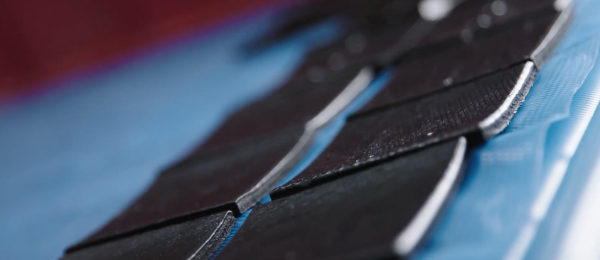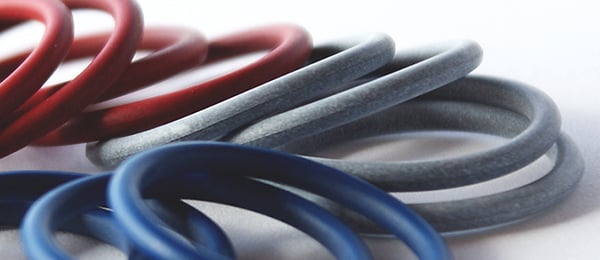
Thermoplastic Materials
There are further materials as an alternative to the permanent elastomers, which have good elastic properties and also have advantages with the mechanical properties and/or the producibility at the same time.
Thermoplastic Elastomers (TPE) belong to the common materials, which can be processed like a thermoplastic, but simultaneously have elastomeric properties. In the sealing technology, TPE Based Polyurethane (TPU) has especially implemented in hydraulic applications with high pressures. Depending on the quantity, the seals can be produced either machined or injected.
- (TPU) Thermoplastic Polyurethane
- (TPU72) Thermoplastic Polyurethane 72 Shore D
- (TPU58) Thermoplastic Polyurethane 58 Shore D
A special material was developed for the limits of TPU, in which a higher chemical or thermal resistance is needed as well as improved mechanical properties:
Thermoplastic Materials
In some applications thermoplastic materials can be a good alternate to the common elastomeric materials and PTFE based materials. Just like PTFE, these materials don't inherent elasticity.
UHMWPE can be used in some applications for piston and rod seals as a cheaper alternative to PTFE materials.
PTFE Based Materials:
PTFE - Polytetrafluorethylene is a sintered material with very high chemical and thermal resistance, but without any elastomeric properties. Sealants made of PTFE are commonly machined out of extruded semi-finished products:
PTFE Based Materials with Fillers:
(TPU) Thermoplastic Polyurethane
Polyurethane is a thermoplastic elastomer, which can get processed per injection molding. It posses an excellent compressive strength and wear resistance and is perfectly suited for all sealing areas where deficient lubrication may occur.
Main features:
- high abrasion resistance
- very good tear resistance
- high compressive strength
- good extrusion resistance
- very good media resistance
Hardness range:
- 60 Shore A to 95 Shore A
- Hardness values on finished parts are commonly given in IRHD-m.
Chemical resistance:
- good resistance against most mineral oil based greases and oils, which are used mainly for hydraulics
- limited hydrolysis resistance
Temperature resistance:
- -30°C to +80°C (+110°C)
(TPU72) Thermoplastic Polyurethane 72 Shore D
Hardness:
- 72 Shore D
Application:
- fluids with lubricating properties
Colour:
- yellow (light)
Main features:
- high abrasion and extrusion resistance
- limited chemical and thermal resistance
Couter surface:
- steel
- hardened steel
- stainless steel
- cast iron
- ceramic coating
Temperature resistance:
- -70°C to +130°C
(TPU58) Thermoplastic Polyurethane 58 Shore D
Application:
- fluids with lubricating properties
Colour:
- yellow
Main features:
- high abrasion resistance and flexibility
Counter surface:
- steel
- hardened steel
- chrome-plated steel
- stainless steel
- cast iron
Hardness:
- 58 Shore D
Temperature resistance:
- -70°C to +120°C
Highred
Highred is a unique high performance polyurethane material based on polyether, with friction reducing additives.
Main features:
- low coefficient of friction in comparison to standard TPU materials
- high breaking elongation and tensile strength
- high wear resistance
- high abrasion resistance
- verg good low temperature properties
- high form stability
Hardness:
- 95 Shore A
Chemical resistance:
- good chemical resistance
- to all common hydraulic oils, excellent resistance to hydrolysis
- good ozone and UV resistance
Temperature resistance:
- -50°C to 120°C
Additional references:
Highred is suitable for fast working cycles and for applications with high speeds. Through the use of this modern material, the efficiency and reliability of the application is increased.
(UHMWPE) Ultra High Molecular Weight Polyethylene
UHMWPE is a polyethylene with a very high molecular weight.
Main features:
- high abrasion and wear resistance
- good sliding properties
- very low water absorption
- good electric insulator
- very low gas permeability
- applicable in the foodstuffs sector
Chemical resistance:
- excellent chemical resistance
Temperature resistance:
- -200°C to +100°C
Additional references:
This material is also available in various modifications on demand.
(PTFE) Polytetrafluorethylene, PTFE virginal
PTFE shows an excellent resistance to almost all chemicals and has the lowest coefficient of friction of any known sealing materials. Due to the low inherent elasticity, PTFE sealing elements are provided with a preload element made either of elastomer or a metal spring for activation.
Main features:
- excellent chemical resistance
- very good weathering resistance
- good ageing, cold and heat resistance
- extremely low coefficient of friction
- sealing elements are made by machining
- improving properties by adding aggregates
Temperature resistance:
- -200°C to +200°C
Chemical resistance:
- excellent resistance to almost all chemicals, even to aggressive acids such as nitrohydrochloric acid
- resistant to all bases, alcohols, ketones, petrol, oil, etc.
(POWE) PTFE Quenched
In the production of quenched PTFE, the reaction mixtures are so strongly cooled down at a defined point of time, so that a further reaction as to a derived product is inhibited. This manufacturing method is called quenching.
Main features:
- high recoverability behaviour compared to standard PTFE even at high elongation
- assembly easiness
- working pressures up to 60 MPa possible
Chemical resistance:
- good resistance against all hydraulic and ester oils
Temperature resistance:
- -200°C to 200°C
Additional references:
The material PTFE quenched is mainly used for Back-up rings.
Materials for use in rotating and linear applications (Gleitef, Stuftef and Varitef sealing) - PTFE Based Materials with Fillers
(PBZ) PTFE - Bronze
Standard material for hydraulics
Colour:
- grey to dark braun
Main features:
- high compressive strength
- good sliding and abrasion behaviour
Counter surface:
- steel
- hardened steel
- chrome-plated steel
- cast iron
Hardness:
- 65 Shore D
Temperature resistance:
- -200°C to +200°C
(PGF) PTFE - Glass Fiber + MoS2
Lubricating and non-lubricating fluids
Colour:
- grey
Main features:
- good chemical resistance
- good dielectric properties
Counter surface:
- steel
- hardened steel
- chrome-plated steel
- cast iron
Hardness:
- 57 Shore D
Temperature resistance:
- -200°C to +200°C
(PKG) PTFE – Carbon + Graphite
Oil hydraulics, water hydraulics and pneumatics, lubricating and non-lubricating fluids
Colour:
- black
Main features:
- good chemical resistance
Counter surface:
- steel
- hardened steel
Hardness:
- 63 Shore D
Temperature resistance:
- -200°C to +200°C
(PKF) PTFE – Carbon Fiber
Water hydraulics, lubricating and non-lubricating fluids
Colour:
- black / grey
Main features:
- good abrasion behaviour in water
- soft counter surfaces
- suitable for short stroke and high frequency applications
Counter surface:
- steel
- stainless steel
- cast iron
- aluminium
- bronze
- alloys
Hardness:
- 54 Shore D
Temperature resistance:
- -200°C to +200°C
(PKO) PTFE – Carbon
Lubricating and non-lubricating fluids
Colour:
- black
Main features:
- soft counter surfaces
Counter surface:
- steel
- hardened steel
- stainless steel
- cast iron
- aluminium
- bronze
- alloys
Hardness:
- 56 Shore D
Temperature resistance:
- -200°C to +200°C
(PSP) PTFE – Special Pigments
Lubricating fluids
Colour:
- turquoise
Main features:
- very good sliding properties
- low friction
- suitable for applications in the foodstuff sector
Counter surface:
- steel
- hardened steel
Hardness:
- 59 Shore D
Temperature resistance:
- -200°C to +200°C
(PMF) PTFE - Mineral Fiber
Multipurpose PTFE material for seals and scrapers in linear applications.
Colour:
- dark grey
Main features:
- high compressive strength
- very good slide and abrasion behaviour
- suitable for short stroke and high frequency applications
Counter surface:
- steel
- hardened steel
- chrome-plated steel
- cast iron
Hardness:
- 58 Shore D
Temperature resistance:
- -200°C to +200°C
(PEEK) Polyetheretherketone
PEEK is a high temperature resistant thermoplastic polymer.
Colour:
- beige
Main features:
- high long-term service temperature
- high thermal and mechanical endurance
- high wear resistance
- good electrical insulator
- excellent chemical resistance
- good UV resistance
- suitable for applications in the foodstuff sector
Hardness range:
- 80 to 90 Shore D
Temperature resistance:
- -65°C to +260°C (+315°C)
Additional references:
This material is also available in various modifications on demand.
(PEK) PTFE Ekonol
Lubricating and non-lubricating fluids, for foodstuff sectors.
Colour:
- beige
Main features:
- good chemical resistance
- suitable for applications in the foodstuff sector
- good sliding properties
Chemical resistance:
- good resistance to all common hydraulic and ester oils
Counter surface:
- steel
- stainless steel
- chrome-plated steel
Hardness:
- 60 Shore D
Temperature resistance:
- -200°C to +200°C

